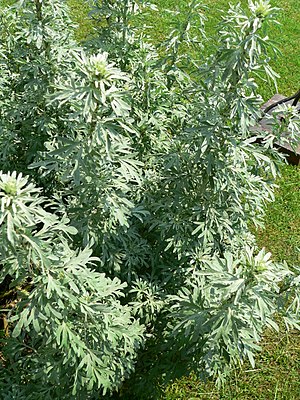ἀψίνθιον
Φίλος με βλάπτων (λυπῶν) οὐδὲν ἐχθροῦ διαφέρει → Laedens amicus distat inimico nihil → Ein Freund, der schadet, ist ganz gelich mir einem Feind
English (LSJ)
τό,
A wormwood, grand wormwood, absinthe, absinthium, absinthe wormwood, mugwort, wermout, wermud, wormit, wormod, Artemisia absinthium, Hp.Morb.3.11, Mul.1.74, X.An. 1.5.1, Thphr. HP 1.12.1, Dsc.3.23; ἀψινθίῳ κατέπασας Ἀττικὸν μέλι Men.708:—also ἄψινθος, ἡ, Aret.CD1.13, but ὁ, Apoc.8.11; and ἀψινθία, ἡ, Alex. Trall.1.10.
II ἀψίνθιον, = ἀβρότονον, Ps.-Dsc.3.24.
2 = Artemisia monosperma, Aq.Pr.5.4.
3 ἀψίνθιον θαλάσσιον = sea wormwood, old woman, Artemisia maritima or Artemisia caerulescens, σέριφον, Dsc.3.23.
Spanish (DGE)
-ου, τό
• Alolema(s): lat. absinthium Plin.HN 19.179
• Grafía: graf. ἀσπίνθιον Hsch., cf. tb. ἀπίνθιον
1 ajenjo, Artemisia absinthium L., Hp.Int.52, Mul.1.84, 97, 2.135, 205, Steril.230, X.An.1.5.1, Thphr.HP 1.12.1, Phld.Ir.44.21, Alex.Mynd.4, Lucr.1.936, Dsc.3.23, Plin.l.c., HN 21.135, Scrib.Larg.192, Cels.2.24.3, Gal.14.327, 332, 751, Alex.Trall.1.339.27, 343.6, Aq.Pr.5.4, PRain.Med.4.9
•fig. Βυζάντιον· ἀψίνθιον, πικρὰ πάντα Men.Sam.100, cf. Philostr.VA 1.21, ἀψινθίῳ <'π>έμιξας Ἀττικὸν μέλι Men.Comp.1.228, cf. Quint.Inst.3.1.5.
2 ἀψίνθιον θαλάσσιον ajenjo marino, Artemisia maritima L. o Artemisia caerulescens καλοῦσι τινες καὶ τὸ σέριφον ἀψίνθιον θαλάσσιον Dsc.3.23, cf. Plin.HN 27.45, 53, Ps.Dsc.3.23.
German (Pape)
[Seite 421] τό, Wermuth, Xen. An. 1, 5, 1 u. Sp.
French (Bailly abrégé)
ου (τό) :
absinthe, plante.
Étymologie: DELG indigène préhellénique.
Russian (Dvoretsky)
ἀψίνθιον: τό бот. полынь (Artemisia absinthium) Xen., Arst.
Greek (Liddell-Scott)
ἀψίνθιον: τό, τὸ φυτὸν ἡ ἀψινθιά, Ἱππ. 491. 1, 619. 53, Ξεν. Ἀν. 1. 5. 1, Θεοφρ. Ἱστ. Φ. 1. 12., 1, κτλ.· ἀψινθίῳ κατέπασας Ἀττικὸν μέλι Μένανδ. ἐν Ἀδήλ. 160· - ὡσαύτως ἄψινθος, ἡ, Ἀρετ. Χρον. Νούσ. Θεραπευτ. 1. 13, Ν. Διαθ. καὶ ἀψινθία, ἡ, Ρήτορες (Walz) τ. 1. σ. 487: ἀψινθιάζω, εἶμαι πικρὸς ὡς τὸ ἀψίνθιον, Βυζ.· - ἀψινθᾶτον (ἐνν. πρόπομα), τό, Ἀλεξ. Τραλλ. 1. 15·- ἀψινθίζομαι, καθίσταμαι πικρὸς ὡς τὸ ἀψίνθιον, Εὐστ. Πονημάτ. 103. 65·- ἀψίνθινος, η, ον, ἐξ ἀψινθίου παρεσκευασμένος, Ἀλεξ. Τραλλ. 1. 15.
Greek Monotonic
ἀψίνθιον: τό, το φυτό αψιθιά, σε Ξεν.
Frisk Etymological English
Grammatical information: n.
Meaning: wormwood, Artemisia Absinthium (Hp.).
Other forms: also ἄψινθος f. (m.) and ἀψινθία f.
Derivatives: ἀψινθίτης οἶνος (Dsc.); ἀψινθᾶτον drink prepared with w. (Aët.) and ἀψινθάτιον (Pap.); cf. Lat. absinthiātum (vinum).
Origin: PG [a word of Pre-Greek origin]
Etymology: The suffix -νθ- proves Pre-Gr. origin.
Middle Liddell
Frisk Etymology German
ἀψίνθιον: {apsínthion}
Forms: auch ἄψινθος f. (m.) und ἀψινθία f.
Grammar: n.,
Meaning: Wermut, Artemisia Absinthium (Hp., X. usw.).
Derivative: Ableitungen: ἀψίνθινος (Alex. Trall.), ἀψινθίτης οἶνος (Dsk. usw., s. Redard Les noms grecs en -της 96); außerdem ἀψινθᾶτον Trank aus Wermut bereitet (Aët., Alex. Trall.) und ἀψινθάτιον (Pap.; nach den Nomina auf -άτιον); vgl. lat. absinthiātum (vinum).
Etymology: Schon das νθ-Element läßt auf vorgriechischen Ursprung schließen, vgl. Schwyzer 61.
Page 1,204
Chinese
原文音譯:¥yinqoj 阿普新拖士
詞類次數:名詞(2)
原文字根:不 飲 相當於: (לַעֲנָה) (מַר / מָרָה) (רֹאשׁ)
字義溯源:茵蔯,苦艾
出現次數:總共(2);啓(2)
譯字彙編:
1) 茵蔯(2) 啓8:11; 啓8:11
Wikipedia EN
Artemisia absinthium (wormwood, grand wormwood, absinthe, absinthium, absinthe wormwood, mugwort, wermout, wermud, wormit, wormod) is a species of Artemisia native to temperate regions of Eurasia and Northern Africa and widely naturalized in Canada and the northern United States. It is grown as an ornamental plant and is used as an ingredient in the spirit absinthe as well as some other alcoholic beverages
Translations
wormwood
Albanian: pelin i zi, pelin; Arabic: حَبَق اَلرَّاعِيّ; Egyptian Arabic: صبر; Moroccan Arabic: شيبة; Armenian: օշինդր, բարձվենյակ; Asturian: axenxu; Azerbaijani: yovşan; Bashkir: әрем; Basque: asentsio; Belarusian: палын; Bulgarian: пелин; Catalan: donzell; Chinese Cantonese: 苦艾; Mandarin: 苦艾, 中亞苦蒿, 中亚苦蒿; Czech: pelyněk, pelyněk pravý; Danish: malurt; Dutch: alsem; Erzya: шурьма; Esperanto: absinto; Estonian: koirohi; Finnish: koiruoho, mali; French: armoise, absinthe; Galician: absintio, asento, asente, axenxo, alosna; Georgian: ავშანი, აბზინდა; German: Wermut; Greek: αψιθιά, αρτεμισία; Ancient Greek: ἄψινθος, ἀψίνθιον; Hebrew: ארטימיסיה, לענה; Hungarian: fehér üröm; Ido: absinto; Interlingua: absinthio; Irish: mormónta; Middle Irish: mormónt; Italian: assenzio; Japanese: 苦蓬; Korean: 향쑥; Latin: absinthium, batypicron; Lombard: medeghet; Macedonian: пелин; Maori: taru kawa; Middle English: wormwode; Norman: lianne, hèrbe à puches, absînthe; Norwegian Bokmål: malurt; Nynorsk: malurt; Ojibwe: moosewijiibik, moose-ojiibik; Persian: افسنطین, درمنه; Polish: piołun; Portuguese: absinto; Romanian: pelin; Russian: полынь; Serbo-Croatian Cyrillic: пелен, пѐлин; Roman: pelen, pèlin; Slovak: palina; Slovene: pelin; Spanish: ajenjo, absintio, alosna; Swedish: malört, äkta malört; Tagalog: ahenho; Tashelhit: ⵛⵉⴱⴰ; Thai: โกฏจุฬาลำพา; Turkish: pelin; Ukrainian: полин; Venetian: ménego maèstro; Vietnamese: ngải cứu; Walloon: foirt, absinte; Welsh: wermod lwyd
ar: شيح ابن سينا; az: acı yovşan; bat_smg: metīlė; ba: әрем; be: палын горкі; bg: обикновен пелин; br: huelenn-c'hwerv; bs: pelin; co: assensiu; csb: piołën; cs: pelyněk pravý; cy: wermod lwyd; da: havemalurt; de: Wermutkraut; el: αρτεμισία το αψίνθιον; eo: absinto; et: koirohi; eu: asentsio; fa: خاراگوش; fi: koiruoho; frr: weremk; fr: absinthe; ga: mormónta; gl: absintio; gn: ajenjo; hr: pravi pelin; hsb: połon; hu: fehér üröm; hy: դառը օշինդր; io: absinto; is: malurt; ja: ニガヨモギ; ka: მწარე აბზინდა; kk: ащы жусан; ko: 향쑥; ky: эрменшыбак; li: aels; lt: pelynas; lv: vērmele; mk: пелин; mn: агь; mrj: шодышуды; nl: absintalsem; nn: malurt; no: malurt; os: ризæджы хос;: bylica piołun; ps: مستياره; pt: absinto; ro: pelin; ru: полынь горькая; sh: pelen; simsk: palina pravá; sl: pravi pelin; sr: обични пелин; sv: malört; ta: மருக்கொழுந்து; tg: тахач; tr: pelin otu; uk: полин гіркий; uz: ermon; vep: kojeghein; wa: foirt; wuu: 中亚苦蒿; zh: 中亚苦蒿

